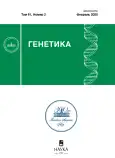Comparative Analysis of Gut Metagenomes of Patients with Depression by Signature Genes of Faecalibacterium prausnitzii at the Strain Level
- Authors: Averina O.V.1, Kovtun A.S.1, Danilenko V.N.1
-
Affiliations:
- Vavilov Institute of General Genetics Russian Academy of Sciences
- Issue: Vol 61, No 2 (2025)
- Pages: 35-44
- Section: ГЕНЕТИКА МИКРООРГАНИЗМОВ
- URL: https://journal-vniispk.ru/0016-6758/article/view/291699
- DOI: https://doi.org/10.31857/S0016675825020043
- EDN: https://elibrary.ru/uvnipj
- ID: 291699
Cite item
Abstract
Using two different methodological approaches, bioinformatic and quantitative PCR, a comparative analysis of gut metagenomes of patients with depression and healthy volunteers was carried out based on the representation of signature bacterial genes encoding key enzymes for the production of metabolites as biomarkers for depression, complementary genes from the genomes of the commensal bacterium Faecalibacterium prausnitzii. Using the in-silico approach, the strain specificity of biomarker genes was revealed, their clustering into groups was carried out and their distribution in 36 metagenomes of patients with depression and 38 healthy volunteers was investigated. Primers were selected for a number of genes from the most common groups. Using them, a quantitative PCR analysis of 15 metagenomes from patients with depression and 15 metagenomes from healthy volunteers was performed. A comparative analysis of the data obtained revealed a statistically significant decrease in the level of representation of genes encoding glutamate synthase GltB, asparagine synthetase AsnA, serine- hydroxymethyltransferase in gut metagenomes of patients with depression. Based on the data obtained, these genes can be recommended as biomarkers for the development of test systems for the diagnosis of clinical depression by the gut microbiome.
Keywords
About the authors
O. V. Averina
Vavilov Institute of General Genetics Russian Academy of Sciences
Author for correspondence.
Email: olgavr06@mail.ru
Russian Federation, Moscow, 119991
A. S. Kovtun
Vavilov Institute of General Genetics Russian Academy of Sciences
Email: olgavr06@mail.ru
Russian Federation, Moscow, 119991
V. N. Danilenko
Vavilov Institute of General Genetics Russian Academy of Sciences
Email: olgavr06@mail.ru
Russian Federation, Moscow, 119991
References
- Dantzer R., O’Connor J.C., Freund G.G. et al. From inflammation to sickness and depression: When the immune system subjugates the brain // Nat. Rev. Neurosci. 2008. V. 9. № 1. P. 46–56. https://doi.org/10.1038/nrn2297
- Bachmann S. Epidemiology of suicide and the psychiatric perspective // Int. J. Environ. Res. Public Health. 2018. V. 15. № 7. https://doi.org/10.3390/ijerph15071425
- Meyyappan A.C., Forth E., Wallace C.J.K. et al. Effect of fecal microbiota transplant on symptoms of psychiatric disorders: a systematic review // BMC Psychiatry. 2020. V. 20. № 1. e299. https://doi.org/10.1186/s12888-020-02654-5
- Аверина О.В., Даниленко В.Н. Микробиота кишечника человека: роль в становлении и функционировании нервной системы // Микробиология. 2017. Т. 86. № 1. С. 1–19. https://doi.org/10.7868/S0026365617010050
- Averina O.V., Zorkina Y.A., Yunes R.A. et al. Bacterial metabolites of human gut microbiota correlating with depression // Int. J. Mol. Sci. 2020. V. 21. № 23. e9234. https://doi.org/10.3390/ijms21239234
- Averina O.V., Poluektova E.U., Zorkina Y.A. et al. Diagnosis and treatment of depression // Int. J. Mol. Sci. 2024. V. 25. № 11. https://doi.org/10.3390/ijms25115782
- Kovtun A.S., Averina O.V., Angelova I.Y. et al. Alterations of the composition and neurometabolic profile of human gut microbiota in major depressive disorder // Biomedicines. 2022. V. 10. № 9. https://doi.org/10.3390/biomedicines10092162
- Hao Z., Wang W., Guo R. et al. Faecalibacterium prausnitzii (ATCC 27766) has preventive and therapeutic effects on chronic unpredictable mild stress-induced depression-like and anxiety-like behavior in rats // Psychoneuroendocrinology. 2019. V. 104. P. 132–142. https://doi.org/10.1016/j.psyneuen.2019.02.025
- Camacho C., Coulouris G., Avagyan V. et al. BLAST+: Architecture and applications // BMC Bioinform. 2009. V. 10. № 10. https://doi.org/10.1186/1471-2105-10-421
- Quinlan A.R., Hall I.M. BEDTools: A flexible suite of utilities for comparing genomic features // Bioinformatics. 2010. V. 26. № 6. P. 841–842. https://doi.org/10.1093/bioinformatics /btq033
- Wood D.E., Salzberg S.L. Kraken: Ultrafast metagenomic sequence classification using exact alignments // Genome Biol. 2014. V. 15. № 3. https://doi.org/10.1186/gb-2014-15-3-r46
- Sievers F., Wilm A., Dineen D. et al. Fast, scalable generation of high-quality protein multiple sequence alignments using Clustal Omega // Mol. Syst. Biol. 2011. V. 5. e539. https://doi.org/10.1038/msb.2011.75
- Untergasser A., Nijveen H., Rao X. et al. Primer3Plus, an enhanced web interface to Primer3 // Nucl. Acids Res. 2007. V. 35. P. W71–W74. https://doi.org/10.1093/nar/gkm306
- Cao Y., Shen J., Ran Z.H. Association between Faecalibacterium prausnitzii reduction and inflammatory bowel disease: A meta-analysis and systematic review of the literature // Gastroenter. Resear. Pract. 2014. V. 2014. https://doi.org/10.1155/2014/872725
- Fitzgerald C.B., Shkoporov A.N., Sutton T.D.S. et al. Comparative analysis of Faecalibacterium prausnitzii genomes shows a high level of genome plasticity and warrants separation into new species-level taxa // BMC Genom. 2018. V. 19. № 1. e931. https://doi.org/10.1186/s12864-018-5313-6
- De Filippis F., Pasolli E., Ercolini D. Newly explored Faecalibacterium diversity is connected to age, lifestyle, geography, and disease // Curr. Biol. 2020. V. 30. № 24. P. 4932–4943. https://doi.org/10.1016/j.cub.2020.09.063
- Lopez-Siles M., Duncan S.H., Garcia-Gil L.J. et al. Faecalibacterium prausnitzii: From microbiology to diagnostics and prognostics // ISME J. 2017. V. 11. P. 841–852.
- Lopez-Siles M., Martinez-Medina M., Suris-Valls R. et al. Changes in the abundance of Faecalibacterium prausnitzii phylogroups I and II in the intestinal mucosa of inflammatory bowel disease and patients with colorectal cancer // Inflamm. Bowel Dis. 2016. V. 22. № 1. P. 28–41. https://doi.org/10.1097/MIB.0000000000000590
- Benevides L., Burman S., Martin R. et al. New insights into the diversity of the genus Faecalibacterium // Front. Microbiol. 2017. V. 8. https://doi.org/10.3389/fmicb.2017.01790
- Bai Z., Zhang N., Jin Y. et al. Comprehensive analysis of 84 Faecalibacterium prausnitzii strains uncovers their genetic diversity, functional characteristics, and potential risks // Front. Cell. Infect. Microbiol. 2023. V. 12. https://doi.org/10.3389/fcimb.2022.919701
- Li W., Lin X., Liang H. et al. Genomic and functional diversity of the human-derived isolates of Faecalibacterium // Front. Microbiol. 2024. V. 15. https://doi.org/10.3389/ fmicb.2024.1379500
- Tanno H., Chatel J.-M., Martin R. et al. A new gene markers for classification and quantification of Faecalibacterium spp. in the human gut // FEMS Microbiol. Ecology. 2023. V. 99. № 5. https://doi.org/10.1093/femsec/fiad035
- Fu X., Lu Y., Wu J. et al. Alterations of plasma aspartic acid, glycine and asparagine levels in patients with major depressive disorder // Zhejiang Da Xue Xue Bao Yi Xue Ban 2012. V. 41. № 2. P. 132–138. Chinese. PMID: 22499508
- Pu J., Liu Y., Zhang H. et al. An integrated meta-analysis of peripheral blood metabolites and biological functions in major depressive disorder // Mol. Psychiatry. 2021. V. 26. P. 4265–4276. https://doi.org/10.1038/s41380-020-0645-4
- Yang X., Wang G., Gong X. et al. Effects of chronic stress on intestinal amino acid pathways // Physiology & Behavior. 2019. V. 204. P. 199–209. https://doi.org/ 10.1016/j.physbeh. 2019. 03.001
Supplementary files










